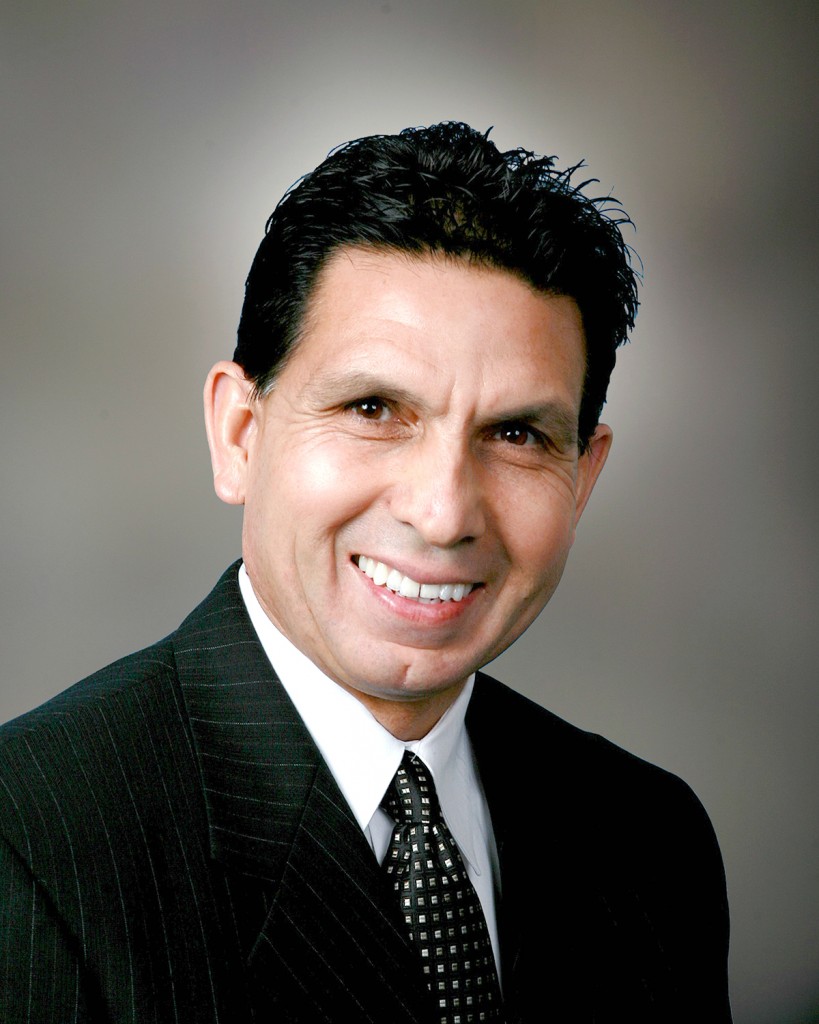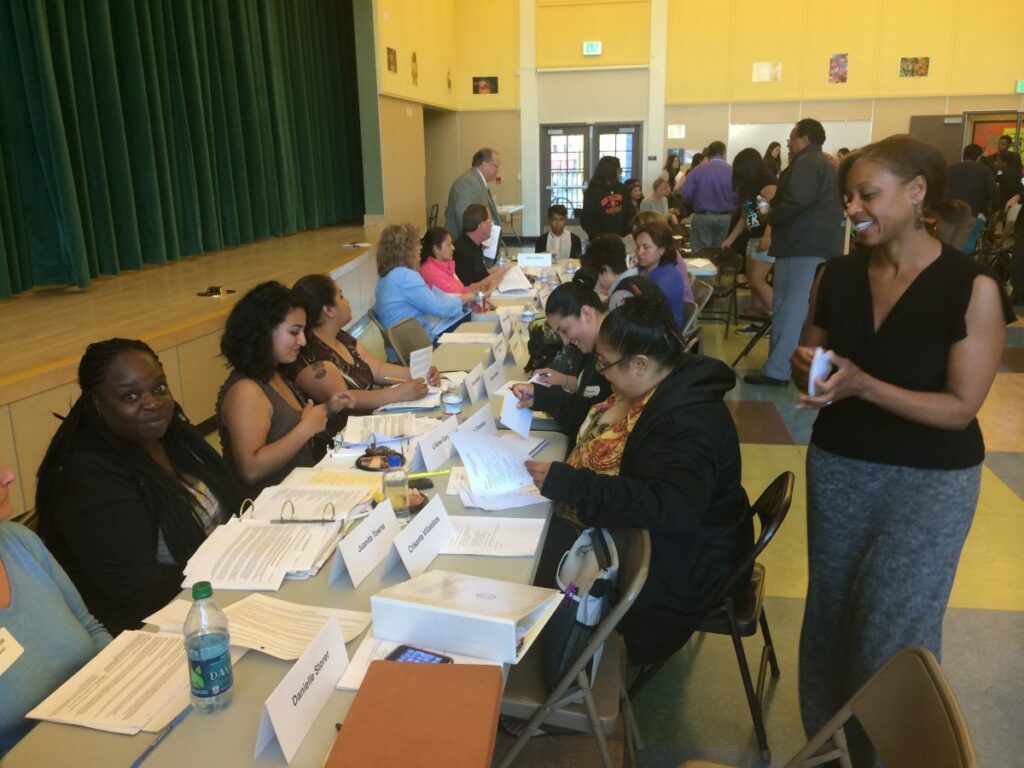California’s 58 county offices of education generally receive far less attention than the school districts within their geographic boundaries. But they have been given an important role in implementing the financial reforms championed by Gov. Jerry Brown. In particular, they are responsible for approving the Local Control and Accountability Plans that every district is required to draw up. To get a sense of their expanding roles and their views on how LCAPs are working, EdSource conducted interviews with county superintendents of schools in Orange County, Sacramento County, Santa Clara County and Tulare County in May 2016. Click on the boxes below to find out what they had to say.

Al Mijares
Orange County Superintendent
Al Mijares: Orange County Superintendent

What lessons have you learned from the first two years of LCAPs in your county?
Perhaps the most critical lesson is that in order to have effective and meaningful stakeholder engagement, consideration must be given to educating parents, community members and other stakeholders. That means providing timely and relevant information about changes in school funding, the focus on desired outcomes, and what their roles and responsibilities are as they move forward.
Having strong relationships with our districts is also extremely important. The LCAP is about continuous improvement, so we must continue our efforts to be proactive in supporting our districts.
Are you inspired, frustrated, overwhelmed or any combination of those?
I would say that a combination of all three would be appropriate, but above all we are inspired by the opportunity to engage more thoroughly with our stakeholders and share our successes. Our organization has gone to great lengths to help educate our stakeholders on the Local Control Funding Formula (LCFF) and the LCAP in order to empower them to participate in the process more thoroughly. It has been inspirational to see parents develop an understanding of the new funding and accountability system and have them get more involved in the process for continuous improvement.
What goals did you start with two years ago, and where are you now?
From the start, we wanted our districts to understand that the LCAP was a strategic planning process focused on continuous improvement rather than an exercise in compliance. That has certainly been the case, and we have seen an increase in the overall quality of Local Control and Accountability Plans as districts and their stakeholders are actively pursuing continuous improvement. From a county office approval perspective, we also strived to approve district budgets and LCAPs by Aug. 15 of each year, and we have been successful in meeting that goal.
What examples of significant changes have you seen in your county office?
Since the introduction of the LCFF, we have seen even greater collaboration throughout our own organization, as well as a continual appraisal of how we are spending money in relation to student outcomes. The LCFF eliminated most categorical programs, creating an incentive for county offices to ask critical questions about the efficacy of programs – and invest in those that have the greatest impact on students.
The LCAP document is longer with the addition of the annual update. Can parents, students and community groups understand it?
LCAPs have become very large and in-depth documents. As we work to educate stakeholders on the overall process, we are finding ways to create simplified versions for busy families and community members, including the addition of executive summaries and easy-to-understand infographics.
Do the LCAPs need to be reformatted to make them more user-friendly to all parties with an interest in them?
It’s always a balance. LCAPs in their current format contain critical data that’s used to drive decision-making and improve student outcomes. At the same time, we are always striving to create more user-friendly documents for our stakeholders.
What is your overall assessment of the LCAPs going into their third year? Do they matter? If so, how? If not, how could they be improved?
I believe that LCAPs do matter, and they are having a positive impact on public education. As a county office, in addition to developing our own plan, we have an opportunity to review and approve all district LCAPs within Orange County. What we have seen over the past three years can be summarized in three words: adjusting, learning and growing.
In the first year (2014-15 LCAP), districts were faced with a new funding formula, emergency regulations, a temporary LCAP template and a short window to implement. They adjusted very well. Districts had permanent regulations and a new LCAP template to implement in the second year (2015-16 LCAP). What we witnessed at a county level was that districts were learning and adapting very quickly. We are now in our third year (2016-17 LCAP), and we see tremendous interest in district LCAPs. Districts are demonstrating their experience through high-quality LCAPs, an emergence of best practices and a focus on increased outreach, transparency and engagement with stakeholders.

David Gordon
Sacramento County Superintendent
David Gordon: Sacramento County Superintendent

What lessons have you learned from the first two years of LCAPs in your county?
Districts benefit from customized technical assistance. They have different needs depending on their size and resources. The process for developing an LCAP cannot be concentrated into a few months. Key events and activities, such as reporting on metrics as they become available, must be scheduled throughout the year. Change takes time, and this is an enormous adjustment for everyone.
Are you inspired, frustrated, overwhelmed or any combination of those?
We must be careful that completing a template not become a compliance exercise. We need to keep the districts focused on continuous improvement, which can be extremely challenging. We are all waiting for more information on the rubrics and eager to learn how they will be structured and used. There is a good deal of anticipation about how support for districts will be provided and customized to the needs at the local level.
What goals did you start with two years ago, and where are you now?
Many districts that began the process with numerous goals have consolidated them into fewer goals, with the actions and services aligned accordingly. The consolidation comes from realizing that fewer goals help to see the plan in a more holistic manner. In our own county LCAP we have maintained the same five goals because they are aligned to our accountability model. Districts were able to report progress in many areas after the first year of implementation, but some targets will take more time to achieve.
What examples of significant changes have you seen in your county?
The fiscal and program staff have collaborated to develop and monitor the LCAP, whereas this may not have been the way other plans were implemented in the past. There also has been an increase in the stakeholder engagement process: broader representation, groups working in a more advisory capacity, and more opportunities for involvement. The transparency of the planning process has been at the forefront.
The document may be longer with the addition of the annual update. Can parents, students and community groups understand it?
The LCAPs should be about the same length in year three as they were in year two as a result of the Annual Update that was added a year ago. Many districts break the components into smaller sections or present the information in a simplified format so they can share it with the various stakeholder groups and solicit their input. Some districts share LCAP updates and information in newsletters and online. Districts also have translated the materials into languages that parents are able to best understand.
What is your overall assessment of the LCAPs going into their third year? Do they matter? If so, how? If not, how could they be improved?
The LCAPs continue to play an important role in the local planning process. Using the same template this year will help districts concentrate on the content of the plan rather than focusing on a new format, which was very time-consuming. Districts now have greater access to state data regarding the metrics that must be reported in the LCAP. We look forward to seeing how the LCAP requirements will dovetail with any plans associated with the federal Every Student Succeeds Act (ESSA).

Jon Gundry
Santa Clara County Superintendent
Jon Gundry: Santa Clara County Superintendent

What lessons have you learned from the first two years of LCAPs in your county?
One of the first lessons learned was that in order for the process to be successful, there was a need to be collaborative. This collaboration is twofold: As a county office we need to cultivate a relationship with our local districts in order to be partners throughout the process. Secondly, there was a need to build and maintain a high level of teamwork between our educational services and our business services branch in order to provide the highest level of technical assistance through the process and have a solid review in the summer.
Are you inspired, frustrated, overwhelmed or any combination of those?
The process of aligning the work of our districts with the ultimate goal of student success is exciting. However, we must also understand that the transition to a new way of funding Local Education Agencies (LEAs) with local control was a shift in California. Large transitions like these are complex. It is inspiring to see local districts engaging their stakeholders with the goal of increasing and improving student outcomes like never before.
What goals did you start with two years ago, and where are you now?
The timeline the first year was very short, so the goals were to train the LEAs, provide guidance as it was received from the state and create an internal plan for the review process. We now have a system of support for our LEAs where we match a district with one educational services staff member and one business services advisor so that there is a consistent pair of staff who are the points of contact for our local districts.
We also have worked with our surrounding counties, as well as statewide, on calibration of the review process. While we still see ourselves as partners in the work with our districts, we also know that the roles of County Offices are evolving to include being a technical assistance provider for districts whose LCAPs are not approved, when a district requests technical assistance, or when districts fail to improve pupil achievement.
What examples of significant changes have you seen in your county?
The largest significant change in the county and in the state is the stakeholder engagement process in creating the plan. Prior to the LCAP, there was no mechanism for meaningful stakeholder engagement for all districts. In our county, we have seen individual districts engage stakeholders and receive feedback from a tremendous cross-section of their district. In our largest high school district, we have seen the addition of participatory budgeting where students, parents, teachers, classified staff and the community held a democratic process to decide how they felt funds should be used.
The document is longer with the addition of the annual update. Can parents, students and community groups understand it?
We anticipate a change in the template for the 2017-2018 cycle. In our county, we have met with several members of community-based organizations who voiced concern about the transparency and readability of LCAPs, which can be more than 100 pages long. We have advocated that districts create executive summaries that are no longer than two pages. We also have explained that these executive summaries should be translated into the appropriate languages. We are working on creating a template for the executive summary that districts can use.
What is your overall assessment of the LCAPs going into their third year? Do they matter? If so, how? If not, how could they be improved?
LCAPs are extremely important. They are the district’s three-year plan for how they will meet the needs of their students and community. They work hand in hand with local strategic plans to identify goals, objectives and specific actions and strategies in order to increase student outcomes. We also will also use our LCAPs for our federal accountability system.

Jim Vidak
Tulare County Superintendent
Jim Vidak: Tulare County Superintendent

What lessons have you learned from the first two years of LCAPs in your county?
We have learned that implementation of the LCAP is as much about process as it is about producing a workable document. For example, how stakeholders are involved in the plan, and how we measure the effectiveness of what we are doing with students, are very important for a living document that isn’t just about compliance. We also have to remember that these are local plans and districts have local needs.
Are you inspired, frustrated, overwhelmed or any combination of those?
We need to keep in mind the LCAP is an evolving process. It is inspiring to see how other districts and county offices are collaborating to share ideas in order to meet the expectations of the LCAP. Recognizing that the LCAP is about continuous improvement and utilizing collaboration as a viable resource can alleviate feeling overwhelmed. The fact that we have added additional LCAP technical support and have promoted a professional learning community among our districts through our “Leadership and Learning” forums has gone a long way to better serve our districts and help them avoid frustration.
What goals did you start with two years ago, and where are you now?
We are continuing to work on goals that center on increasing and improving services for students, particularly for those students who are considered the most fragile in our county. Students who are attending community school as a result of an expulsion, or on probation, or those educated in our court and community schools continue to be the focus of our goals and the related actions and services.
What examples of significant changes have you seen in your county?
One area that we are very excited about is looking for ways to expand and improve services for our students who are foster youth. With a new foster youth services coordinator on staff, we are exploring ways of improving services for this subgroup to better connect them to school and to provide them with ongoing stability in the educational system countywide. In addition, we will be adding six student transition specialists to our court/community schools for the purpose of ensuring that our students can return to their home schools and/or obtain a high school diploma at the completion of their program.
The LCAP document is longer with the addition of the annual update. Can parents, students and community groups understand it?
It’s important that we write LCAPs that stakeholders can access and understand. This means working to make the language in our plans concise and transparent, and to avoid the “educationalese” that is difficult for our parents and community members to understand. We advocate this to our districts in order to improve stakeholder understanding of their plans. Next year, we will have a one-page bilingual LCAP summary for our stakeholders that will help parents better understand the purpose and goals of the LCAP.
What is your overall assessment of the LCAPs going into their third year. Do they matter? If so, how? If not, how could they be improved?
The LCAPs matter, and with the impending alignment of the state and federal continuous improvement, support and accountability system, they will continue to be prominent as we plan strategically to meet the needs of all students. The LCAP is a viable working document that is referred to on a regular basis as it guides us through the academic year. It’s important for leaders in education to be involved in giving input on future template revisions and other tools such as the rubrics that will support this important process in our state.
To get more reports like this one, click here to sign up for EdSource’s no-cost daily email on latest developments in education.












Comments
Comments Policy
We welcome your comments. All comments are moderated for civility, relevance and other considerations. Click here for EdSource's Comments Policy.